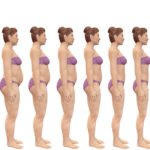If you are interested in shedding a few excess pounds, you might think that caffeine could be a big help. After all, it’s touted as an appetite suppressant, and you don’t have to resort to a prescription to get it since you can drink it daily with your morning coffee. So, as long as you don’t overdo it with the caffeine, it should help you in your quest to lose weight, right? Unfortunately, maybe not. According to one study, caffeine does nothing to help weight loss–at least in small amounts.
The study, which took place at the State University of New York at Buffalo, found that caffeine is not effective as an appetite suppressant for more than a very brief period of time or as a weight-loss aid.1 Panek-Shirley, Leah M.; et al. “Caffeine Transiently Affects Food Intake at Breakfast.” Journal of the Academy of Nutrition and Dietetics. 19 July 2018. Accessed 5 August 2018. http://jandonline.org/article/S2212-2672(18)30768-8/fulltext. These results are based on an investigation that included 50 men and women. All of the subjects were between the ages of 18 and 50 and in good overall health.
The participants came to the lab on three separate occasions and were provided with a juice beverage that contained either 1 mg/kg of caffeine, 3 mg/kg of caffeine, or no caffeine at all. A half hour after drinking the juice, all of the participants were offered a breakfast buffet at which they had free reign to eat whatever and as much as they wanted.
It turned out that those who drank the caffeinated juice consumed about 10 percent less, an average of 70 fewer calories, than their counterparts who had no caffeine. But before you get too excited over the 10 percent reduction in calories, the bad news is that the volunteers who had the caffeine ended up reporting eating more throughout the day and made up the difference in calories after a few hours.
Interestingly, when the researchers interviewed the subjects during a fourth meeting session, they discovered that the intake of caffeine had no effect on how the subjects perceived their appetite. The investigators also considered the body mass index (BMI) of the participants and could find no impact that consuming caffeine had on BMI.
This study was very small and would need to be replicated with a much larger population sample to provide more conclusive evidence of the results. Also, it should be noted that the amounts of caffeine used in the study were very, very low—maxing out at 3 mg. A single cup of coffee, on the other hand, contains 95 mg. However, these are important indications, since it is widely believed that caffeine can suppress the appetite, either through a rise in metabolism or changes in brain chemicals linked to appetite. This initial finding is a good reminder that caffeine, at least at low levels, is not a magic bullet when it comes to weight loss.
Plus, while coffee has been found to offer certain health benefits, such as protection from liver damage, and lowering the risk of stroke, and even extending lifespan, it has also been linked with cancer. And many people drink far too much coffee daily, which can lead to problems including nervousness, insomnia, stomach upset, and increased heart rate.
And while nothing is a magic bullet for shedding pounds, there are some healthier natural options that might provide assistance in your weight-loss efforts. A 2016 study at Myongji University in Seoul, South Korea showed that green coffee bean extract may be able to lower body fat by influencing hormones that regulate metabolism.2 Choi, Bong-Keun; et al. “Green coffee bean extract improves obesity by decreasing body fat in high-fat diet-induced obese mice.” Asian Pacific Journal of Tropical Medicine. July 2016. Accessed 6 August 2018. http://www.sciencedirect.com/science/article/pii/S1995764516301067?via%3Dihub. Green coffee bean extract is derived from unroasted coffee beans, which are high in chlorogenic acid (that ends up being removed during the roasting process). In addition, aged oolong tea was found in a 2018 study at South China University of Technology in Guangzhou to help promote weight loss by improving metabolism and fatty acid oxidation and reducing inflammation.3 Yuan, Erdong; et al. “Aged Oolong Tea Reduces High-Fat Diet-Induced Fat Accumulation and Dyslipidemia by Regulating the AMPK/ACC Signaling Pathway.” Nutrients. February 2018. Accessed 6 August 2018. http://www.ncbi.nlm.nih.gov/pmc/articles/PMC5852763/.
Both the green coffee bean extract and aged oolong tea can be part of an overall program of healthy living that includes eating a nutritious diet and getting regular exercise to keep your weight in check, as well as provide numerous other health benefits. And their benefits come without all of the problems that daily caffeinated coffee can produce.
References
| ↑1 | Panek-Shirley, Leah M.; et al. “Caffeine Transiently Affects Food Intake at Breakfast.” Journal of the Academy of Nutrition and Dietetics. 19 July 2018. Accessed 5 August 2018. http://jandonline.org/article/S2212-2672(18)30768-8/fulltext. |
|---|---|
| ↑2 | Choi, Bong-Keun; et al. “Green coffee bean extract improves obesity by decreasing body fat in high-fat diet-induced obese mice.” Asian Pacific Journal of Tropical Medicine. July 2016. Accessed 6 August 2018. http://www.sciencedirect.com/science/article/pii/S1995764516301067?via%3Dihub. |
| ↑3 | Yuan, Erdong; et al. “Aged Oolong Tea Reduces High-Fat Diet-Induced Fat Accumulation and Dyslipidemia by Regulating the AMPK/ACC Signaling Pathway.” Nutrients. February 2018. Accessed 6 August 2018. http://www.ncbi.nlm.nih.gov/pmc/articles/PMC5852763/. |












I’m confused by your comments
I’m confused by your comments about this study, your article said the subjects were given either 1mg/kg caffeine, or 3mg/kg caffeine, I assume that means the subjects were given either 1mg of caffeine for every kg of bodyweight of the subject, or 3mg of caffeine for every kg of bodyweight of the subject, which is completely different from what you’d have a reader believe!
Please clarify what you meant by what was written!
We are not sure what you are
We are not sure what you are asking–how is the amount different from what we explain in the rest of the article? Here’s a link to the study if that helps: http://www.sciencedirect.com/science/article/pii/S2212267218307688